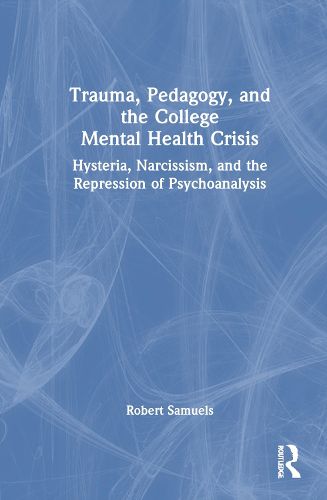Readings Newsletter
Become a Readings Member to make your shopping experience even easier.
Sign in or sign up for free!
You’re not far away from qualifying for FREE standard shipping within Australia
You’ve qualified for FREE standard shipping within Australia
The cart is loading…






Trauma, Pedagogy, and the College Mental Health Crisis argues that psychoanalytic theory and practice offers a solution to the large increase in students seeking mental health services.
Robert Samuels returns to the roots of psychoanalysis, drawing from Freud's and Lacan's conceptions of hysteria and narcissism. This book examines the idea that the repression of psychoanalysis has resulted in a situation where students are being misdiagnosed and mistreated as the underlying structures shaping narcissism and hysteria are misrecognized. Samuels suggests that the more people are trained to focus on their own thoughts and feelings, the more they take on self-destructive thoughts and behaviors in a neurotic way and that psychoanalysis offers a solution.
Trauma, Pedagogy, and the College Mental Health Crisis will be of interest to psychoanalysts in practice and in training, as well as mental health professionals working with adolescents and professionals working in higher education. It will also be relevant to readers interested in adolescent mental health, higher education, parenting, and politics.
$9.00 standard shipping within Australia
FREE standard shipping within Australia for orders over $100.00
Express & International shipping calculated at checkout
Trauma, Pedagogy, and the College Mental Health Crisis argues that psychoanalytic theory and practice offers a solution to the large increase in students seeking mental health services.
Robert Samuels returns to the roots of psychoanalysis, drawing from Freud's and Lacan's conceptions of hysteria and narcissism. This book examines the idea that the repression of psychoanalysis has resulted in a situation where students are being misdiagnosed and mistreated as the underlying structures shaping narcissism and hysteria are misrecognized. Samuels suggests that the more people are trained to focus on their own thoughts and feelings, the more they take on self-destructive thoughts and behaviors in a neurotic way and that psychoanalysis offers a solution.
Trauma, Pedagogy, and the College Mental Health Crisis will be of interest to psychoanalysts in practice and in training, as well as mental health professionals working with adolescents and professionals working in higher education. It will also be relevant to readers interested in adolescent mental health, higher education, parenting, and politics.